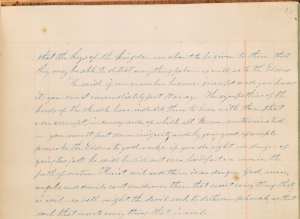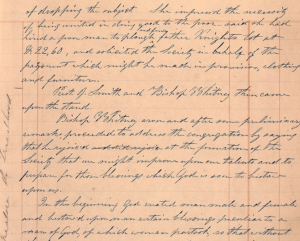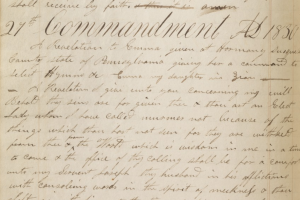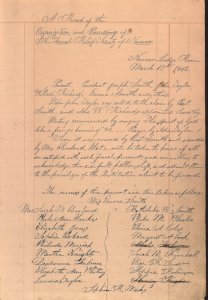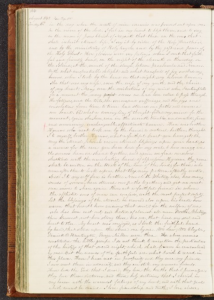Section 84
In section 57 the Lord identified the site for his temple in Zion. That was the first reference to a specific Latter-day temple in the Doctrine and Covenants. There is not another one until section section 84, which tells the saints to build the temple and forges the gospel links between their missionary work, the gathering of scattered Israel, the fulfillment of ancient prophecies, and the building of New Jerusalem, crowned with its holy temple.
Joseph’s history designates section 84 as a “Revelation . . . On Priesthood.”[1] That is worth considering. It could be described as a revelation on temple ordinances, covenants, the gathering of Israel, missionary work, the law of consecration, and the imminent coming of the Savior to “reign with my people,” in Zion, as He says in closing (D&C 84:119). So why priesthood? What was Joseph seeing? What difference will it make to our understanding when we see it too?
The answer may be in a long digression between verses 7 and 31. It seems, at first, to tangent from the point of the revelation, which began with a prophecy about building the temple. It turns out, however, that the digression is becomes an explanation of priesthood the relationship between priesthood, ordinances, and the endowment of power we need to transcend the fall and regain God’s presence. In short, priesthood validates the ordinances to be performed in the prophesied temple.
Moses understood that, the revelation says, and tried to teach it plainly, but the Israelites of his day did not generally want the endowment of priesthood power. They could not, therefore, endure God’s presence. Angry, God gave them less priesthood than he had to offer but as much as they were willing to receive. Joseph later taught about this strange human tendency to “set up stakes and say thus far will we go and no farther.” By contrast, Moses and Joseph were like Peter and the others who, Joseph said, received “the fullness of priesthood or the law of God” when the Savior was transfigured before them.[2]
I remember a Sunday School class discussion in which the consensus was that God does not get angry. It was an example of wresting the scriptures, which testify in section 84 and elsewhere that the Lord’s “anger was kindled against them,” and justifiably so. They rejected him, his plan, his sacrifice, his redeeming love, his fullness. The misguided class was trying to articulate truth about God’s character. It was a little like the process by which the creeds of Christianity eventually determined that God had no passions or emotions like anger. Section 84 does a better job. The Lord is justifiably angry, it says. There is nothing wrong with justified anger. The problem is the choice to express it badly. God does not express his anger the way a fallen mortal might. Section 84 says that when God is angry at his children for rejecting his blessings, he responds by offering as much as they are presently willing to receive, preparatory to our receiving more (D&C 84:23-26).
Having concluded his digression, the Lord returns to his main theme, namely, how priesthood holders will serve in the temple to be built on the consecrated spot in Independence, Missouri. Saints who are full of priesthood power—figurative descendants of Moses and Aaron—will be filled with the Lord’s glory in the temple. One would think this revelation would provide the saints enough incentive to begin building a temple on the dedicated site in Independence, Missouri—Zion. They did not, however. There are several complicated reasons why, and later revelations will cover these.
The saints obeyed Section 84 in other specific ways. A council of high priests assigned Orson Hyde and Hyrum Smith to write a rebuke the church leaders in Missouri as verse 76 commanded.[3] As instructed in verses 112-114, bishop Whitney and Joseph Smith left Kirtland “to fulfill the Revelation,” making important contacts in New York City, visiting Albany, and prophesying in Boston.[4] The gospel continues to be preached to “all who have not received it” (D&C 84:75). Many people have made the covenant to receive, obtain, and magnify the priesthood as outlined in section 84. Many people have obeyed the law of consecration as instructed in verses 103-110.
Perhaps the most important result of Section 84 is that is raised Joseph’s consciousness of the fundamental importance of priesthood and, inseparably, the temple. He had listened attentively all night at age seventeen while Moroni explained the imperative need to obtain restored priesthood in order to seal the human family together before the Savior’s coming, but the doctrine of the priesthood distilled on Joseph like dew from heaven (D&C 121:45). Considerable dew condensed during the night nine years later, when section 84 explained the priesthood’s past and projected its future use in temples.[5]
Notes
[1] “History, 1838–1856, volume A-1 [23 December 1805–30 August 1834],” p. 229, The Joseph Smith Papers, accessed July 7, 2020, https://www.josephsmithpapers.org/paper-summary/history-1838-1856-volume-a-1-23-december-1805-30-august-1834/235.
[2] “Discourse, 27 August 1843, as Reported by James Burgess,” p. [12], The Joseph Smith Papers, accessed July 7, 2020, https://www.josephsmithpapers.org/paper-summary/discourse-27-august-1843-as-reported-by-james-burgess/3.
[3] Joseph Smith, Letterbook, 1829-1835, pages, 20-25; Kirtland Minute Book, January 13, 1833, Church History Library, Salt Lake City. See Section 82.
[4] Newel K. Whitney, undated statement, Newel K. Whitney Collection, L. Tom Perry Special Collections, Harold B. Lee Library, Brigham Young University. Samuel H. Smith, Journal, 26 November 1832, Church History Library, Salt Lake City. Joseph to Emma Smith, 13 July 1832, Community of Christ Archives, Independence, Missouri.
[5] Richard Lyman Bushman, Joseph Smith: Rough Stone Rolling (New York: Knopf, 2005), 202-05.


